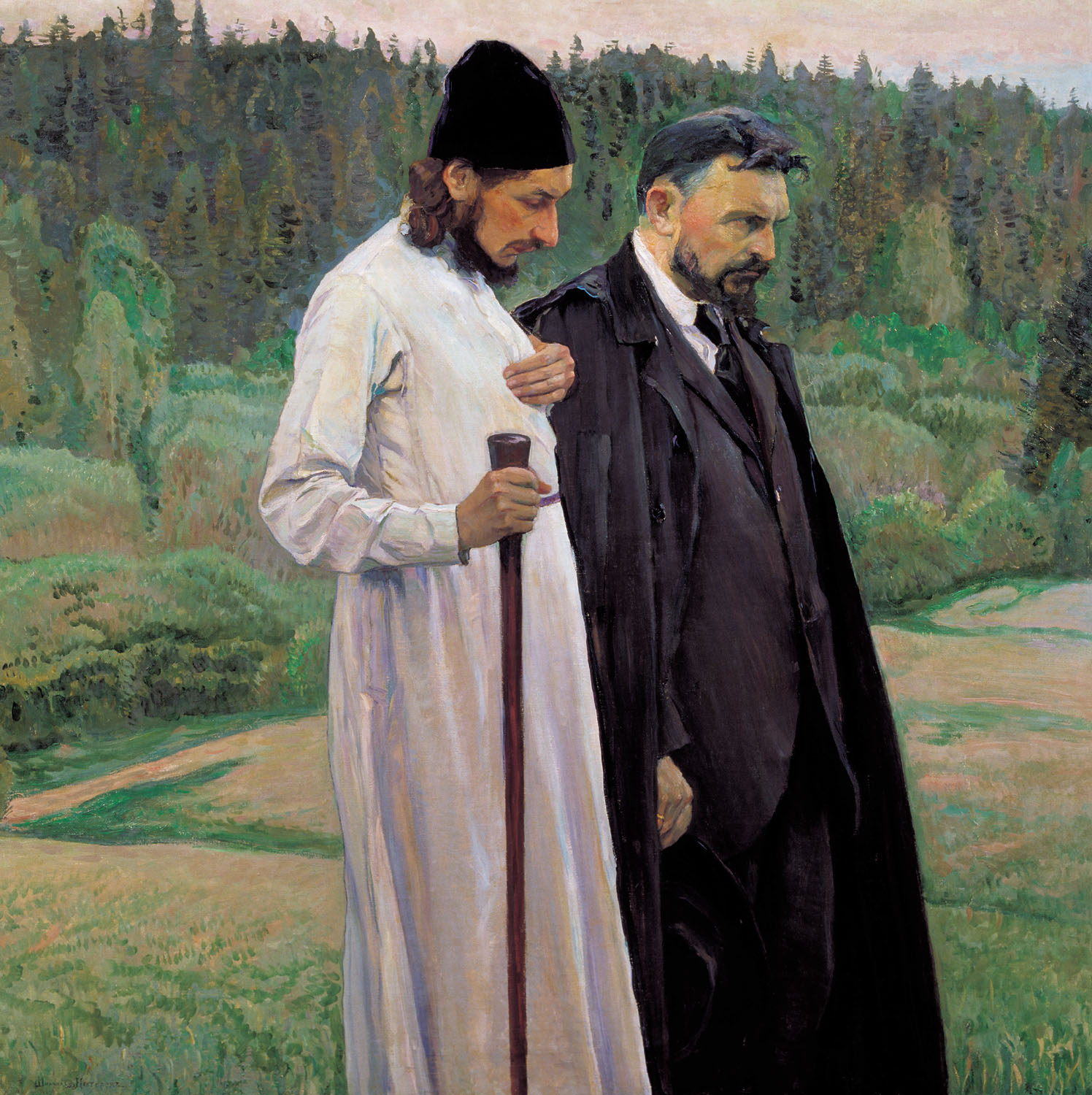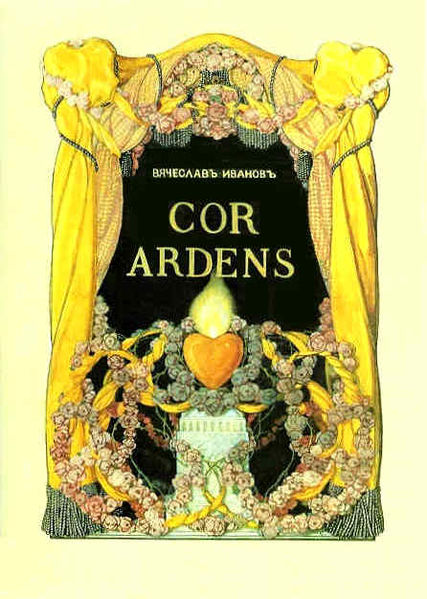|
Novy Put
''Novy Put'' (Но′вый путь, New Way) was a Russian religious, philosophical and literary magazine, founded in 1902 in Saint Petersburg by Dmitry Merezhkovsky and Zinaida Gippius. Initially a literary vehicle for the Religious and Philosophical Meetings, it was aiming to promote the so-called "Godseeking" doctrine through the artistic means of Russian Symbolism. History The first issue of ''Novy Put'' came out in November 1902. The magazine's editor-in-chief was Pyotr Pertsov, but the real leaders were Dmitry Merezhkovsky and Zinaida Gippius. The magazine, addressing the Saint Petersburg's intelligentsia, stood in opposition to the Moscow branch of Symbolists which gathered round the Scorpion publishing house and were led by Valery Bryusov. ''Novy Put'' remained loyal to Symbolism's initial values ("Arts for arts' sake", the cult of individuality) even if Merezhkovskys have by this time condemned "the new individualism" which, as Gippius put it, "devoured our society as ... [...More Info...] [...Related Items...] OR: [Wikipedia] [Google] [Baidu] |
Pyotr Pertsov
Pyotr Petrovich Pertsov (Пётр Петрович Перцов, 16 June 1868 — 19 May 1947) was a Russian poet, publisher, editor, literary critic, journalist and memoirist associated with the Russian Symbolist movement. Biography Pyotr Petrovich Pertsov was born in Kazan, a son of Pyotr Petrovich, the youngest of the four Pertsov brothers. His uncles Vladimir, Konstantin and Erast were well-known journalists; the latter, a poet, in 1831-1832 was closely linked to Alexander Pushkin. Pyotr Pertsov studied in the 2nd Kazan Gymnasium. In 1887 he enrolled into the Kazan University to study law. He graduated in 1892. In 1890 Pertsov published his first poems in Saint Petersburg newspapers ''Nedelya'' (Week) and ''Novosti'' (News) to some favourable reviews, including the one by Afanasy Fet. In 1892 he became friends with Nikolai Mikhaylovsky and joined the staff of ''Russkoye Bogatstvo'', then a liberal narodnik's magazine, as a head of the bibliography department. The infatuation ... [...More Info...] [...Related Items...] OR: [Wikipedia] [Google] [Baidu] |
Alexander Blok
Alexander Alexandrovich Blok ( rus, Алекса́ндр Алекса́ндрович Бло́к, p=ɐlʲɪˈksandr ɐlʲɪˈksandrəvʲɪtɕ ˈblok, a=Ru-Alyeksandr Alyeksandrovich Blok.oga; 7 August 1921) was a Russian lyrical poet, writer, publicist, playwright, translator and literary critic. Early life Blok was born in Saint Petersburg, into an intellectual family of Alexander Lvovich Blok and Alexandra Andreevna Beketova. His father was a law professor in Warsaw, and his maternal grandfather, Andrey Beketov, was a famous botanist and the rector of Saint Petersburg State University. After his parents' separation, Blok lived with aristocratic relatives at the manor Shakhmatovo near Moscow, where he discovered the philosophy of Vladimir Solovyov, and the verse of then-obscure 19th-century poets, Fyodor Tyutchev and Afanasy Fet. These influences would affect his early publications, later collected in the book ''Ante Lucem''. Career and marriage In 1903 he married the actress ... [...More Info...] [...Related Items...] OR: [Wikipedia] [Google] [Baidu] |
Defunct Magazines Published In Russia
{{Disambiguation ...
Defunct (no longer in use or active) may refer to: * ''Defunct'' (video game), 2014 * Zombie process or defunct process, in Unix-like operating systems See also * * :Former entities * End-of-life product * Obsolescence Obsolescence is the state of being which occurs when an object, service, or practice is no longer maintained or required even though it may still be in good working order. It usually happens when something that is more efficient or less risky r ... [...More Info...] [...Related Items...] OR: [Wikipedia] [Google] [Baidu] |
Defunct Literary Magazines Published In Europe
{{Disambiguation ...
Defunct (no longer in use or active) may refer to: * ''Defunct'' (video game), 2014 * Zombie process or defunct process, in Unix-like operating systems See also * * :Former entities * End-of-life product * Obsolescence Obsolescence is the state of being which occurs when an object, service, or practice is no longer maintained or required even though it may still be in good working order. It usually happens when something that is more efficient or less risky r ... [...More Info...] [...Related Items...] OR: [Wikipedia] [Google] [Baidu] |
1904 Disestablishments In The Russian Empire
Nineteen or 19 may refer to: * 19 (number), the natural number following 18 and preceding 20 * one of the years 19 BC, AD 19, 1919, 2019 Films * ''19'' (film), a 2001 Japanese film * ''Nineteen'' (film), a 1987 science fiction film Music * 19 (band), a Japanese pop music duo Albums * ''19'' (Adele album), 2008 * ''19'', a 2003 album by Alsou * ''19'', a 2006 album by Evan Yo * ''19'', a 2018 album by MHD * ''19'', one half of the double album ''63/19'' by Kool A.D. * ''Number Nineteen'', a 1971 album by American jazz pianist Mal Waldron * ''XIX'' (EP), a 2019 EP by 1the9 Songs * "19" (song), a 1985 song by British musician Paul Hardcastle. * "Nineteen", a song by Bad4Good from the 1992 album ''Refugee'' * "Nineteen", a song by Karma to Burn from the 2001 album ''Almost Heathen''. * "Nineteen" (song), a 2007 song by American singer Billy Ray Cyrus. * "Nineteen", a song by Tegan and Sara from the 2007 album '' The Con''. * "XIX" (song), a 2014 song by Slipknot. ... [...More Info...] [...Related Items...] OR: [Wikipedia] [Google] [Baidu] |
1902 Establishments In The Russian Empire
Nineteen or 19 may refer to: * 19 (number), the natural number following 18 and preceding 20 * one of the years 19 BC, AD 19, 1919, 2019 Films * ''19'' (film), a 2001 Japanese film * ''Nineteen'' (film), a 1987 science fiction film Music * 19 (band), a Japanese pop music duo Albums * ''19'' (Adele album), 2008 * ''19'', a 2003 album by Alsou * ''19'', a 2006 album by Evan Yo * ''19'', a 2018 album by MHD * ''19'', one half of the double album ''63/19'' by Kool A.D. * ''Number Nineteen'', a 1971 album by American jazz pianist Mal Waldron * ''XIX'' (EP), a 2019 EP by 1the9 Songs * "19" (song), a 1985 song by British musician Paul Hardcastle. * "Nineteen", a song by Bad4Good from the 1992 album '' Refugee'' * "Nineteen", a song by Karma to Burn from the 2001 album ''Almost Heathen''. * "Nineteen" (song), a 2007 song by American singer Billy Ray Cyrus. * "Nineteen", a song by Tegan and Sara from the 2007 album '' The Con''. * "XIX" (song), a 2014 song by Slipknot. ... [...More Info...] [...Related Items...] OR: [Wikipedia] [Google] [Baidu] |
Semyon Frank
Semyon Lyudvigovich Frank (russian: Семён Лю́двигович Франк; 28 January 1877 – 10 December 1950) was a Russian philosopher. Born into a Jewish family, he became a Christian in 1912. Early life and studies Semyon Lyudvigovich Frank was born in Russia in 1877, in Moscow, in a Jewish family. His father, a doctor, died when the boy was young, and he was brought up by his maternal grandfather, M. Rossiansky, an Orthodox Jew, who taught him Hebrew and took him to the synagogue. Through his stepfather, the populist V. I. Zak, he was introduced to the works of N. K. Mikhailovsky and other revolutionaries. At secondary school he became interested in Marxism. In 1894 he began to study law at Moscow University, but spent more time preaching socialism to the workers, but by 1896 he found Marxist economic theories unsatisfactory, though he remained a socialist. In 1899 he wrote a revolutionary pamphlet which got him expelled from Moscow; so he completed his studies o ... [...More Info...] [...Related Items...] OR: [Wikipedia] [Google] [Baidu] |
Nikolai Lossky
Nikolay Onufriyevich Lossky. (; – 24 January 1965), also known as N. O. Lossky, was a Russian philosopher, representative of Russian idealism, intuitionist epistemology, personalism, libertarianism, ethics and axiology (value theory). He gave his philosophical system the name ''intuitive-personalism''. Born in Latvia, he spent his working life in St. Petersburg, New York, and Paris. He was the father of the influential Christian theologian Vladimir Lossky.Sciabarra, Chris Matthew.Investigation: the Search for Ayn Rand's Russian Roots" ''Liberty'' 1999-10. 10 August 2006. Life Lossky was born in Krāslava then in the Russian Empire. His father, Onufry Lossky, had Belarusian roots (his grandfather was a Greek-Catholic Uniate priest) and was an Eastern Orthodox Christian; his mother Adelajda Przylenicka was Polish and Roman Catholic. He was expelled from school for propagating atheism. Lossky undertook postgraduate studies in Germany under Wilhelm Windelband, Wilhelm Wundt and G ... [...More Info...] [...Related Items...] OR: [Wikipedia] [Google] [Baidu] |
Sergey Bulgakov
Sergei Nikolaevich Bulgakov (; russian: Серге́й Никола́евич Булга́ков; – 13 July 1944) was a Russian Orthodox theologian, priest, philosopher, and economist. Biography Early life: 1871–1898 Sergei Nikolaevich Bulgakov was born on 16 July 1871 to the family of an Orthodox priest (Nikolai Bulgakov) in the town of Livny, Oryol guberniya, in Russia. The family produced Orthodox priests for six generations, beginning in the sixteenth century with their ancestor Bulgak, a Tatar from whom the family name derives. Metropolitan Macarius Bulgakov (1816–1882), one of the major Eastern Orthodox theologians of his days, and one of the most important Russian church historians, was a distant relative. At the age of fourteen, after three years at the local parish school, Bulgakov entered the seminary in Orel. In 1888, however, Bulgakov quit the seminary after a loss of his faith. Bulgakov later notes that the passion for the priesthood waned as he grew disenc ... [...More Info...] [...Related Items...] OR: [Wikipedia] [Google] [Baidu] |
Nikolai Berdyayev
Nikolai Alexandrovich Berdyaev (; russian: Никола́й Алекса́ндрович Бердя́ев; – 24 March 1948) was a Russian philosopher, theologian, and Christian existentialist who emphasized the existential spiritual significance of human freedom and the human person. Alternative historical spellings of his surname in English include "Berdiaev" and "Berdiaeff", and of his given name "Nicolas" and "Nicholas". Biography Nikolai Berdyaev was born at Obukhovo, Kiev Governorate (present-day Obukhiv, Ukraine) in 1874, in an aristocratic military family. His father, Alexander Mikhailovich Berdyaev, came from a long line of Russian nobility. Almost all of Alexander Mikhailovich's ancestors served as high-ranking military officers, but he resigned from the army quite early and became active in the social life of the aristocracy. Nikolai's mother, Alina Sergeevna Berdyaeva, was half-French and came from the top levels of both French and Russian nobility. He also h ... [...More Info...] [...Related Items...] OR: [Wikipedia] [Google] [Baidu] |
Pavel Florensky
Pavel Alexandrovich Florensky (also P. A. Florenskiĭ, Florenskii, Florenskij; russian: Па́вел Алекса́ндрович Флоре́нский; hy, Պավել Ֆլորենսկի, Pavel Florenski; – December 8, 1937) was a Russian Orthodox theologian, priest, philosopher, mathematician, physicist, electrical engineer, inventor, polymath and neomartyr. Biography Early life Pavel Aleksandrovich Florensky was born on in the town of Yevlakh in Elisabethpol Governorate (in present-day western Azerbaijan) into the family of a railroad engineer, Aleksandr Florensky. His father came from a family of Russian Orthodox priests while his mother Olga (Salomia) Saparova (Saparyan, Sapharashvili) was of the Tbilisi Armenian nobility in Georgia.Natalino Valentini, (ed.) Pavel Florenskij, ''La colonna e il fondamento della verità'', San Paolo editore, 2010, p. lxxi. His maternal grandmother Sofia Paatova (Paatashvili) was from an Armenian family from Karabakh, living in Bolnisi, Ge ... [...More Info...] [...Related Items...] OR: [Wikipedia] [Google] [Baidu] |
Vyacheslav Ivanov (poet)
Vyacheslav Ivanovich Ivanov (russian: Вячесла́в Ива́нович Ива́нов; – 16 July 1949) was a Russian poet and playwright associated with the Russian Symbolism, Russian Symbolist movement. He was also a philosopher, translator, and literary critic. Early life Born in Moscow, Ivanov graduated from the First Moscow Gymnasium with a gold medal and entered the Moscow University where he studied history and philosophy under Sir Paul Vinogradoff. In 1886, he moved to the Berlin University to study Roman law and economics under Theodor Mommsen. During his stay in Germany, he absorbed the thoughts of Friedrich Nietzsche and German Romantics, notably Novalis and Friedrich Hölderlin. In 1886 Ivanov married Darya Mikhailovna Dmitrievskaya, the sister of his close childhood friend Aleksei Dmitrievsky. From 1892 he studied archaeology in Rome, completing his doctoral dissertation there. In 1893 he met Lydia Zinovieva-Annibal, a poet and translator. Having both rece ... [...More Info...] [...Related Items...] OR: [Wikipedia] [Google] [Baidu] |



